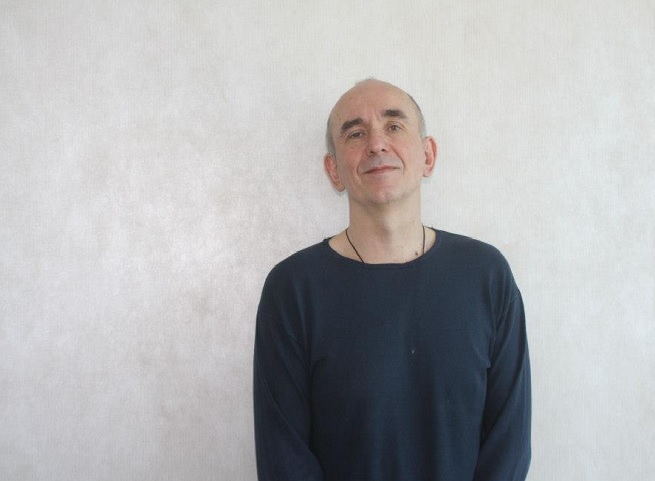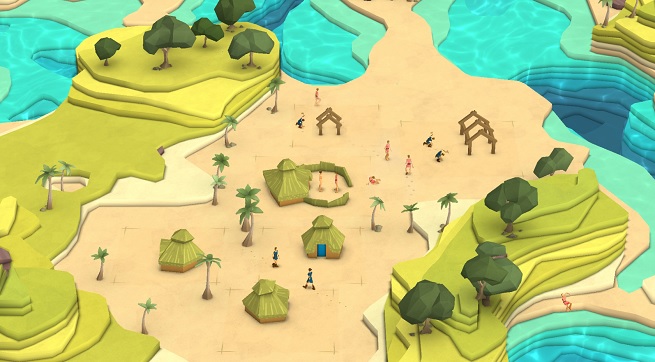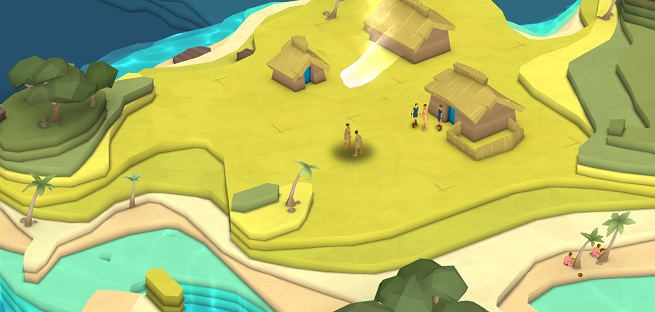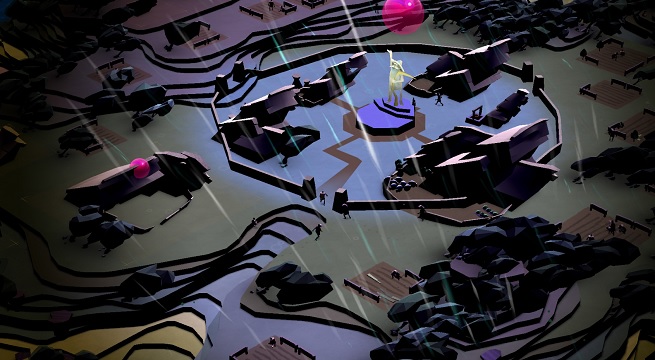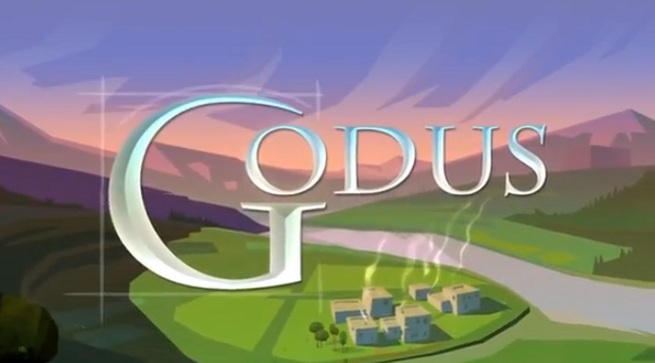Peter Molyneux is a man of superlatives. When he says that Godus is the best game he’s ever made, he’s sticking his neck out again. Molyneux is one of the elder statesmen of gaming, having risen to fame on “god games” such as Black & White and Populous. So it’s no surprise he has returned to the genre where players can become gods over virtual creatures with Godus.
Godus is PC and iOS game, the first hybrid title from Molyneux’s startup 22cans in the United Kingdom. It is an example of what you get when you take a legendary console game veteran and set him loose in the brave new world of mobile. Molyneux wants to get 50 million players playing Godus, turning it into a living world.
He is trying to achieve all of this with a team of 30 people, about a tenth of the size of teams he once commanded at Lionhead Studios, now owned by Microsoft, while making console games like the Fable series. But while the size of his team has shrunk, the size of his ambitions have grown to match the potential of gaming’s digital age, with the hundreds of millions or billions of players on mobile devices and connected PCs.
“What we’re really trying to do here is foolishly, ridiculously ambitions,” Molyneux said in a recent interview with GamesBeat at the Game Developers Conference in San Francisco. “Can you create this experience where hardcore gamers can play alongside and with casual gamers. That is an impossible dream. Our answer is Godus.”
AI Weekly
The must-read newsletter for AI and Big Data industry written by Khari Johnson, Kyle Wiggers, and Seth Colaner.
Included with VentureBeat Insider and VentureBeat VIP memberships.
Molyneux said the core of the title is delightful and delicious, where you can “sculpt” with your finger on a tablet or smartphone (or using a mouse on a computer). Godus puts players in the role of a god who can sculpt the living, infinitely moldable world. You can run your finger over the landscape and carve valleys or raise mountains.
Wielding divine powers is not new for Molyneux’s followers. It’s similar to Molyneux’s older title, Black & White. If you advance your civilization, your people will believe in you more. With that belief, you can sculpt more lands, beautifying them with your touch.
The landscapes of the world are simple, yet pretty. The art style is akin to that of a topographical map. You can raise and lower levels. The look is simple enough so that it can scale from low-end mobile devices to high-end PCs.
Ambient life appears in scattered places. You’ll see fish in the water. Storms may sink your ships and you may have to rescue your followers. The sounds and music are soothing and bucolic when things are calm. When the drama heats up, the drums start beating. In the PC version, you’ll be able to scroll out and see a larger map. But there’s no overall map on mobile. Molyneux promises that “up to 50 million gods will rule a trillion followers on a planet the size of Jupiter.”
You can face challenges from rival gods. You can also be an angry god, creating earthquakes, volcanoes, or tornadoes to unleash upon the rival gods and their worlds. You and your people will clash with other gods in multiplayer battles. Your followers can take the names of your actual friends, as the game can extract those names from your friends lists.
Godus has multiple levels of control. You can browse around the world using two fingers, while you sculpt the terrain with one finger. You can set your people loose and let them do things like build homes. Or you can “leash” them and get them to do exactly what you want.
“You don’t have to do it that way,” Molyneux said. “If we wanted to create a real-time strategy game, we would do that. But in Godus, you influence the characters. You can take free will away from your people. I can take them and put them in a spot. But once they are there, they can decide what to do.” You can command the population to develop the land. People will ask if they can build a home at a spot, and you can grant them permission.
“The reason you are doing this is that you are evolving your little people,” he said. “Early in the game, you teach them how to build mud huts. Later in the game, they learn to build a new type of house. As a god, I help them do that. It’s a simple experience, but one with unbelievable consequences to it.”
In some ways, your people progress, like in the Civilization game series. You get a new piece of tech with enough experience, and then you can use that to develop specializations for your people. They can learn how to mine, build factories, and pollute the world.
Molyneux showed how you can send your people on expeditions. You send them out on ships to explore the world. They discover a vast new land with other players. You can sculpt them together. You can send your people to a temple to get a reward. But they might run into a dangerous foe along the way. You can’t just use your god powers to kill off the foe, especially if you’re lacking in such powers. But you can sculpt the land so that your followers are routed around the foe.
“That’s a little like an old game, ‘Lemmings,'” Molyneux said.
The primitive people don’t wage war. But when they arrive at a “philosophical” stage, “they get more ambitious,” Molyneux said. Then they become more aggressive.
You can view your friends’ progress relative to your own. If you tap on icons for those friends, you can visit their worlds.
Molyneux funded the game through a Kickstarter campaign that raised more than $881,000. Godus is a continuation of an ambition that Molyneux had with his previous digital experiment, Curiosity: What’s Inside the Cube? In that game, he got as many as 400,000 people playing at once, pecking away at 25 billion cubelets to uncover what was at the center of a cube.
It took 150 days for the internet to dig through the cubelets. At the end, Molyneux announced Godus. The winner was a player named Bryan Henderson, and Molyneux has promised that Henderson will be the digital god at the center of Godus. Henderson will get a share of the profits of Godus. This intriguing end to Curiosity and cool beginning for Godus was one way that Molyneux figured out how to make the game more personal and make it stand out from what he calls the “999,000 rubbish apps” on the app stores now.
The monetization strategy
The title is in the midst of beta testing and it is gradually scaling up the number of users. It will be free to download on the PC and iOS, and it’s not yet exactly clear how it will make money. Molyneux has been a big critic of the term “free to play” and the way that game developers have been milking players with bad monetization schemes, such as those that allow players to buy victory.
Some of those monetization techniques are creating companies with hundreds of millions of dollars in revenues, but Molyneux believes that those techniques won’t be around five years from now as consumers wise up and get more choices. Molyneux dislikes companies that value analytics over game design, such as Zynga, in his opinion.
Molyneux promises that Godus’ monetization will be unique. It won’t be the crass sort of virtual goods sales that have annoyed users. Rather, Molyneux thinks that Godus fans will regard it as a hobby, if he does his job right, and they will gladly “play to invest” in their hobby over time. You can invest money in your world, but you can’t buy additional god powers.
“We’re going to tempt you, but never demand money,” Molyneux said.
“I love to spend money on my hobby,” he said. “If I get people in the right mindset, spending money should be a delightful experience. Not a painful experience.”
Since Godus worlds are connected, people can’t buy things that give them advantages over other players.
“I have to solve those things and my solution is to tempt you to spend money on things that will enhance your world but not give you a cheat,” Molyneux said.
The biggest game in the world
It certainly sounds like an ambitious monetization scheme to match the ambitious game design of Godus. But it’s classic Molyneux. When I interviewed him at the Casual Connect Europe event in Amsterdam, he said Godus was a godsend.
“Making Godus, I wanted to be as crazily experimental and insanely inventive as the original Populous was in its day. I mean, if you look at it now, it looks atrocious, but in those days it felt like it had that crazy inventiveness,” he said. “This is the core thing that I feel. We are in an almost blessed position in this industry, where all these new gamers, these people who have never played games before or thought of themselves as gamers, are coming in and playing games for the first time. If we don’t give them something that’s just wonderful, that’s superb and inventive and fresh and different, they’re going away again. They don’t care. They’re not loyal. They come in and try something, and, at the moment, they’re trying something brilliant like Candy Crush. Nobody can deny that’s brilliant in its juiciness. And the fantastic Supercell games. But is that it? Can we not take them somewhere else?”
He added, “That’s what Godus is trying to do. It’s trying to say that we can approach things like monetization in a delightful way. It doesn’t have to be this caustic mechanic. We can approach the ability to connect people together in a completely new way. That’s what we’re trying to do with Godus. I don’t care if you call this is a promise. It’s not a promise. This is unquestionably the most wonderful, incredible, delightful, smooth experience that I have ever been involved with.”
VentureBeat's mission is to be a digital town square for technical decision-makers to gain knowledge about transformative enterprise technology and transact. Learn More

